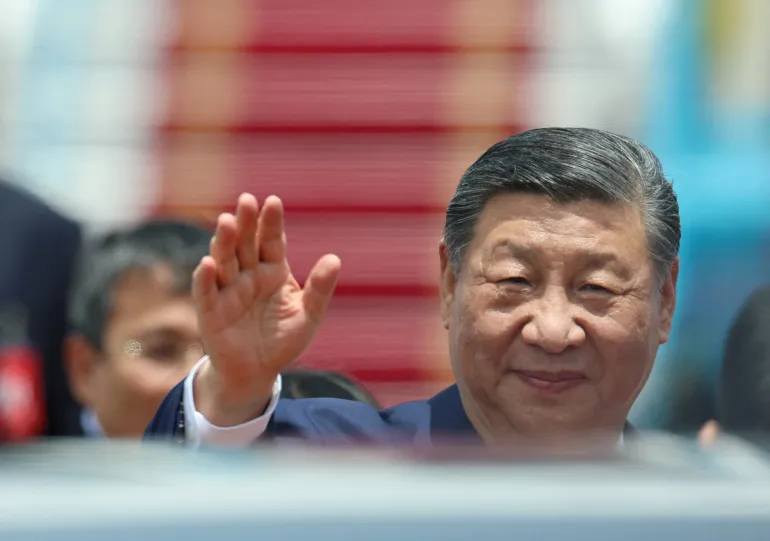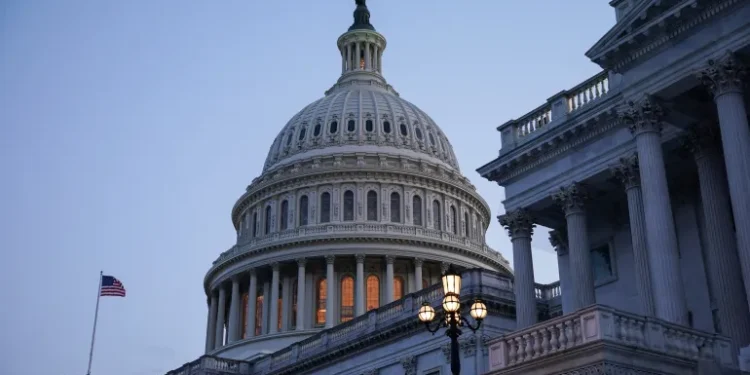Chinese leader, Xi Jinping has arrived in Moscow at the start of a four-day visit to attend Russia’s military parade commemorating the anniversary of the end of the Second World War, known in Russia as Victory Day.
Xi’s visit, which comes as China is engaged in a trade war with the US and soon after Ukraine has accused China of directly aiding Russia’s invasion, underscores his close relationship with Russian President, Vladimir Putin.
It is Xi’s 11th visit to Russia.

The Russian foreign ministry described the trip as “one of the central events in Russian-Chinese relations this year.”
Xi is expected to sign numerous cooperation agreements, deepening the “no limits” relationship between China and Russia.
There will also be discussion of the planned Power of Siberia 2 gas pipeline, which could carry 50bn cubic metres of gas a year from Russia to China.
Xi is expected to hold talks with Putin on Thursday, May 8, 2025, and to attend the Victory Day parade on Friday, May 9, 2025.

China’s People’s Liberation Army will send an honour guard to participate in the ceremony in Moscow for the first time since 2015, and for the first time ever will send an honour guard to join in parallel celebrations in Minsk, the capital of Belarus.
Putin has long attached great importance to May 9, the day when Moscow celebrates its victory over the Nazis.
The Soviet Union lost an estimated 27 million soldiers and civilians during the war, a staggering death toll, which many Russians view as the high cost Moscow had to bear to save the world from the fascist threat.
The Russian leader has drawn upon that emotional history to motivate his forces fighting against Ukraine, falsely casting the Ukrainian leader, President Volodymyr Zelenskyy, who is Jewish, as the head of a Nazi government that once again must be defeated, regardless of the cost.
A Reminder Of China-Russia Relations

Noah Barkin, a senior adviser at Rhodium Group and a visiting senior fellow at the German Marshall Fund of the United States based in Berlin, opined that Xi’s presence in Moscow, alongside Putin, will serve as a stark reminder to Europe of just how close their relationship has become, and the threat that it could one day pose to NATO’s eastern flank.
That closeness may have been overshadowed recently by Donald Trump’s attempts to strike a peace deal in Ukraine that heavily favored Russia, Barkin added, but it will come back into focus now that China is trying to court Europe.
Bilateral trade between China and Russia has reached record levels since Russia’s invasion of Ukraine in 2022, providing Moscow with an economic lifeline at a time when western countries have imposed sanctions on it.
Trade reached $245bn (£183bn) in 2024, 66% more than in 2021.
China maintains it is a neutral party in the war and that it supports a peaceful resolution to the conflict. But in recent months Kyiv has been increasingly outspoken about what it says is China’s direct aid for Moscow’s war efforts.
Two Chinese mercenaries, out of hundreds who have travelled to fight with the Russian army, were caught in the eastern Donetsk region last month.
They did not have a direct link to the Chinese state but recruitment videos are easily found on China’s tightly controlled social media.
Volodymyr Zelenskyy has accused China of turning a blind eye to the participation of its nationals in the war.
Meanwhile, the Chinese leader’s arrival coincided with Ukrainian drone attacks on the Russian capital.
Moscow’s Mayor, Sergei Sobyanin, said that Russia’s air defence units destroyed at least 14 Ukrainian drones overnight.
The attacks forced most of Moscow’s airports to close and Russia’s national carrier Aeroflot said it was reordering timetables to cope with the disruption.
READ ALSO: Ghana Champions Robust Fibre Infrastructure to Drive Digital Economy




















